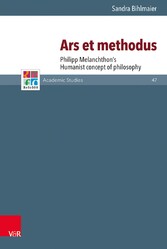Suche
Lesesoftware
Info / Kontakt

Ars et methodus - Philipp Melanchthon's Humanist concept of philosophy
von: Sandra Bihlmaier, Herman J. Selderhuis
Vandenhoeck & Ruprecht Unipress, 2018
ISBN: 9783647570594 , 305 Seiten
Format: PDF
Kopierschutz: Wasserzeichen


Preis: 99,00 EUR
eBook anfordern 
Title Page
4
Copyright
5
Acknowledgments
8
Body
14
1. Introduction
14
1.1 Reading the Renaissance Text
14
1.2 Historians of philosophy and their methodologies
17
1.3 Melanchthon as philosopher and his conception of philosophy
21
1.4 Method, material and aim of study
28
2. On fathers and grandfathers: Melanchthon's heritage of dialectic
32
2.1 Philipp Melanchthon: A Renaissance Humanist
32
2.1.1 The question of authority
36
2.1.2 The theological pressupositions
44
2.1.3 The question of method: the transformation of philosophy
47
2.2 Melanchthon between Tübingen and Wittenberg: The seeds of Reform
50
2.3 Aristotle's legacy: forms of knowledge and discourse
55
2.3.1 Dialectical argumentation
55
2.3.2 Scientific reasoning
63
2.3.3 Persuasive speech
65
2.3.4 Conclusion: Assessments of Aristotle's logic of argumentation
69
2.4 Cicero: on words and things
74
2.4.1 Oratory and philosophy
74
2.4.2 Topica: Memoria repetita conscripta
76
2.5 Theophrastus, Themistius, Alexander of Aphrodisias: From arguments to principles
84
2.6 Boethius: De topicis differentiis: The logic of producing belief
89
2.6.1 Discorvery (inventio) and judgment (iudicatio)
90
2.6.2 Ratio quae rei dubiat faciat fidem
95
2.7 Developments of the Topics in the Middle Ages
99
2.7.1 Omnis bona consequentia tenet per aliquem locum
100
2.7.2 Summulae Logicales
103
2.8 Rudolph Agricola and the all encompassing forms of probable reasoning
108
2.8.1 Melanchthon's encounter with Agricola's dialectic
108
2.8.2 Agricola's De Inventione Dialectica
109
2.8.3 Argumentatio fidem facere conatur
113
2.8.4 Dialectical instruments of proof
115
2.8.5 Concluding remarks
120
2.9 Conclusion
121
3. Philipp Melanchthon's Dialectic and Rhetoric: his reform of the language arts
126
3.1 Melanchthon as representative of Northern Humanism: His immediate predecessors
126
3.1.1 The “Rhetorical Turn”: The Procustean Bed of Renaissance Philosophy
128
3.2 The Melanchthonian Project: Dialectica et Rethorica copulatae sunt
132
3.2.1 Melanchthon's integrative approach: the leitmotif of his pedagogical work
133
3.2.2 Restoring rhetoric for the sake of dialectic
137
3.3 Melanchthon's De Rhetorica libri tres
143
3.3.1 The genus demonstrativum as a genus metodikon
144
3.3.2 The method of the genus metodikon.
146
3.3.2.1 The first part of method: the questions
146
3.3.2.2 The organa of invention
147
3.3.2.3 The questions of scientific inquiry
148
3.3.2.4 The dialectical perspectives
149
3.3.2.5 The status-theory
149
3.3.2.6 Stoic dialectic
150
3.3.2.7 Melanchthon's hermeneutics: the theory of commonplaces
152
3.3.2.8 The second part of method: the loci
154
3.3.2.9 The actual genus demonstrativum and the loci personarum
157
3.3.2.10 Disposition and Elocution
158
3.3.2.11 Conclusion
159
3.4 Melanchthon's Compendiaria Dialectices
160
3.4.1 The Aristotelian structure and the Ciceronian definition
163
3.4.2 The dialectical method of the simple parts
165
3.4.3 The simple speech: propositio
169
3.4.4 The forms of arguments
170
3.4.5 The method of invention
173
3.4.6 Conclusion
175
3.4.7 Stephen Toulmin's assessment of argumentation: A comparison
178
3.5 Melanchthon's Institutiones Rhetoricae
182
3.5.1 Dialectical invention
183
3.5.2 Loci personarum and loci communes
183
3.5.3 Eloquence
185
3.5.4 Conclusion: The early textbooks as a mélange of Aristotelian and rhetorical views
186
3.6 Melanchthon's laudatory speech on eloquence: Necessarias esse ad omne studiorum genus artes dicendi
189
3.6.1 Clear and distinct language
189
3.6.2 The usefulness of literature
192
3.6.3 Erudite theology
194
3.6.4 Conclusion
196
3.7 Melanchthon's Dialectica Libri Quatuor: Ars ac via docendi
196
3.7.1 Is Melanchthon's dialectic a Lutheran dialectic?
197
3.7.2 On simple speech: some epistemological considerations
199
3.7.3 On the method of explaining simple themes
203
3.7.4 On propositions
205
3.7.5 On arguments
206
3.7.6 The method of complex questions: dialectical and rhetorical loci
209
3.7.7 On demonstration: Demonstrative and probable loci
212
3.7.8 Conclusion
214
3.8 Melanchthon's Elementorum Rhetorices Libri Duo: Eloquentia facultas est sapienter et ornate dicendi
215
3.8.1 Eloquence as a guarantor of clear speech
216
3.8.2 The Dialectical origin of rhetoric: the genus didaskalion
218
3.8.3 Conclusion
222
3.9 Melanchthon's Erotemata Dialectices: Dialectica est ars artium, scientia scientiarum
223
3.9.1 Dialectic and Arithmetic
224
3.9.2 On method
228
3.9.3 On propositions
231
3.9.4 On Argument Forms
233
3.9.5 The seats of arguments: the loci
235
3.9.6 The sources of human certainty
236
3.10 Conclusion
243
4. On method and discourse as the criteria of Melanchthonian humanist philosophy
248
4.1 De Philosophia
250
4.1.1 Method and philosophy
252
4.1.2 The cycle of arts
253
4.1.3 For the sake of the Church and of civil order
256
4.2 Liber de Anima: The book on body and mind
257
4.2.1 The treatise on the soul: an anthropology
259
4.2.2 On the intellectual capacity, or mind
260
4.2.3 What is a notion?
263
4.2.4 The passive and the inventor intellect
265
4.2.5 The human and the divine mind
267
4.3 Initia doctrinae physicae: The book on man and nature
268
4.3.1 The multivarious topics of natural knowledge treated in the Initia
270
4.3.2 What is the purpose of natural philosophy?
272
4.3.3 What is the method of natural philosophy?
273
4.3.4 The language of natural philosophy
275
4.4 Ethicae doctrinae elementa: On natural and divine law
278
4.4.1 Natural and civil law
279
4.4.2 On natural law as divine law
280
4.4.3 Dialectical method in ethics
281
4.4.4 Conclusion
282
5. General Conclusion: Quae ratione philosophia tractanda sit
284
6. Bibliography
288
6.1 Primary Literature
288
6.2 Secondary Literature
290
Index of Persons
300
Index of Subjects
302




